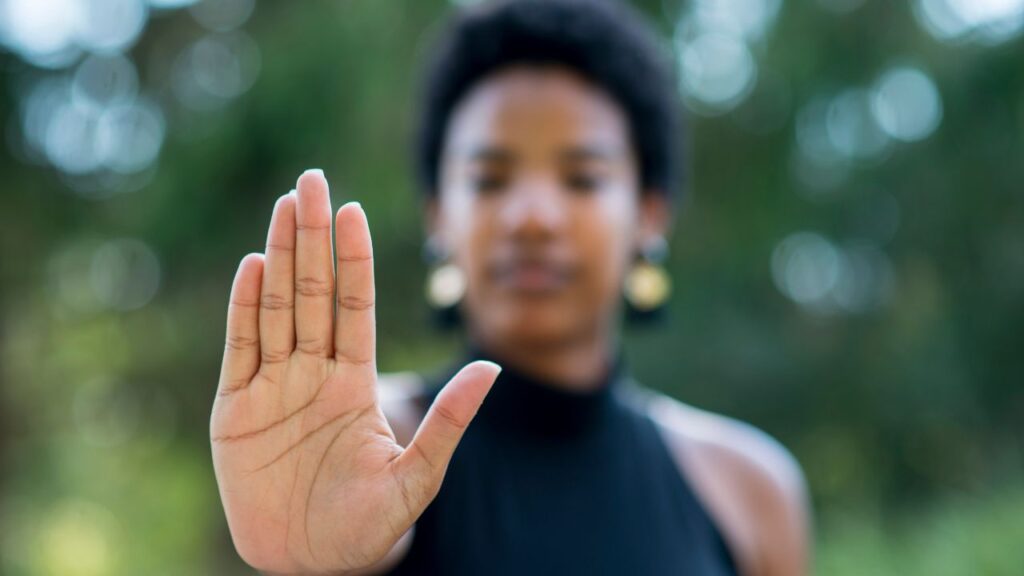Join the Speaking Brazilian YouTube Club to have access to the transcript of this video and many other videos.
Oi, pessoal!
Today, we’re going to talk about things you should not do in Brazil unless you want to annoy Brazilians.
As you know, Brazilians are generally happy and laid-back people, but some things really irritate us.
I made a list of things that bother Brazilians so that you don’t make blunders when you go to Brazil.
1) Assuming that Brazilians speak Spanish

In Brazil, people don’t speak Spanish. So please don’t go to Brazil thinking you will be able to communicate in Spanish. Most Brazilians find this offensive.
Despite being similar languages, Portuguese and Spanish are not the same. If you need to communicate in Spanish, you must first ask, in Portuguese, if the person can speak Spanish.
For example, you can say:
– Desculpe, eu não falo português. Você fala espanhol? (- Sorry, I do not speak Portuguese. Do you speak Spanish?)
2) Criticizing Brazil

Attention! Brazilians love to criticize Brazil, but don’t accept criticism from foreigners.
If you hear a Brazilian complaining about Brazil, smile and nod. If you agree or add something, you will make enemies.
On the other hand, if you mention good things about Brazil, Brazilians will love you and be your best friends.
3) Saying that the Wright brothers invented the airplane
Don’t tell a Brazilian that the Wright brothers invented the airplane unless you want to get into an argument!
I read many articles on this subject before preparing this lesson and realized that to this day, more than a century later, experts still haven’t come to an agreement. Some say that the Wright brothers invented the airplane, and others say it was Santos-Dumont.
As you can imagine, for us Brazilians, there is no doubt. The inventor of the airplane was Alberto Santos-Dumont, a Brazilian born in Minas Gerais in 1873.

Unknown author, Public domain, via Wikimedia Commons
If you go to Rio de Janeiro, you might land at Santos-Dumont airport, which was named after the inventor. You can also visit the house where Santos-Dumont lived in Petrópolis, about an hour’s drive from the capital.
4) Not knowing what the capital of Brazil is
Another thing that makes Brazilians uncomfortable is when a foreigner doesn’t know that the capital of Brazil is neither Rio de Janeiro nor São Paulo.
But if you really want to annoy a Brazilian, just say that the capital of Brazil is Buenos Aires.
The capital of Brazil is Brasília, of course!

5) Assuming that all Brazilians know how to samba, play soccer, and live on the beach
That would be great, but it’s not true. The idea that Brazilians love samba, soccer and carnival is just a stereotype. There is much more than that in Brazil.




So, when talking to a Brazilian, try to find out other things about the country. Avoid mentioning stereotypes, and please don’t ask Brazilians if they know how to dance samba.
6) Implying that Brazil does not have the best soccer in the world
Not all Brazilians like soccer, but many are fanatical fans. And there are two things you shouldn’t say to these people.
First, don’t say that Maradona is better than Pele. Everyone knows that Pele is the best soccer player of all time. 🙂

AFP/SCANPIX, Public domain, via Wikimedia Commons
And second, don’t mention Brazil versus Germany in the 2014 world cup, in which we lost 7-1. It was humiliating!
Okay, I’m kidding. I don’t care about soccer, but many Brazilians take this matter very seriously!
7) Slamming the car door
I find this funny because I don’t care about cars, but I’ve seen many Brazilians irritated because someone slammed their car door.

Usually, if someone does this, the car owner asks:
– Você não tem geladeira em casa? (-Don’t you have a fridge at home?)
I think the idea is that we should close the car door just like we close the fridge: gently.
8) Not greeting or saying goodbye
Brazilians expect you to greet them when you arrive and say goodbye when you leave, usually with kisses and hugs.

If you arrive at a place and don’t say hello, some people say:
– Você dormiu comigo? (- Did you sleep with me?)
Of course, I’m talking about friends and people you know. If you don’t know the person, you don’t need to kiss and hug. Just say “bom dia” (good morning) or “boa noite” (good night) and that’s it.
9) Assuming that Brazilian women are available and will easily agree to date foreign tourists

Obviously, Brazilian women like to be treated with respect like all women in the world.
Not all of them are interested in foreign tourists or anyone else. I shouldn’t need to say this, but here I am.
You can’t imagine the number of inappropriate comments I’ve read on YouTube.
10) Saying to a Brazilian: “you don’t look like a Brazilian”

I’ve been told this a few times. I don’t know how people imagine Brazilians to be, but there is no single way to describe Brazilians.
In Brazil, you will find indigenous people, afro-descendants, descendants of Europeans from all corners of Europe, descendants of Japanese, Chinese, Lebanese, and the list goes on.
So, in terms of physical appearance, basically, anyone you see on the street could be Brazilian. 🙂
That’s it, everybody! I hope you had fun with this class on Brazilian culture.
Até a próxima!
Your teacher,
Virginia


